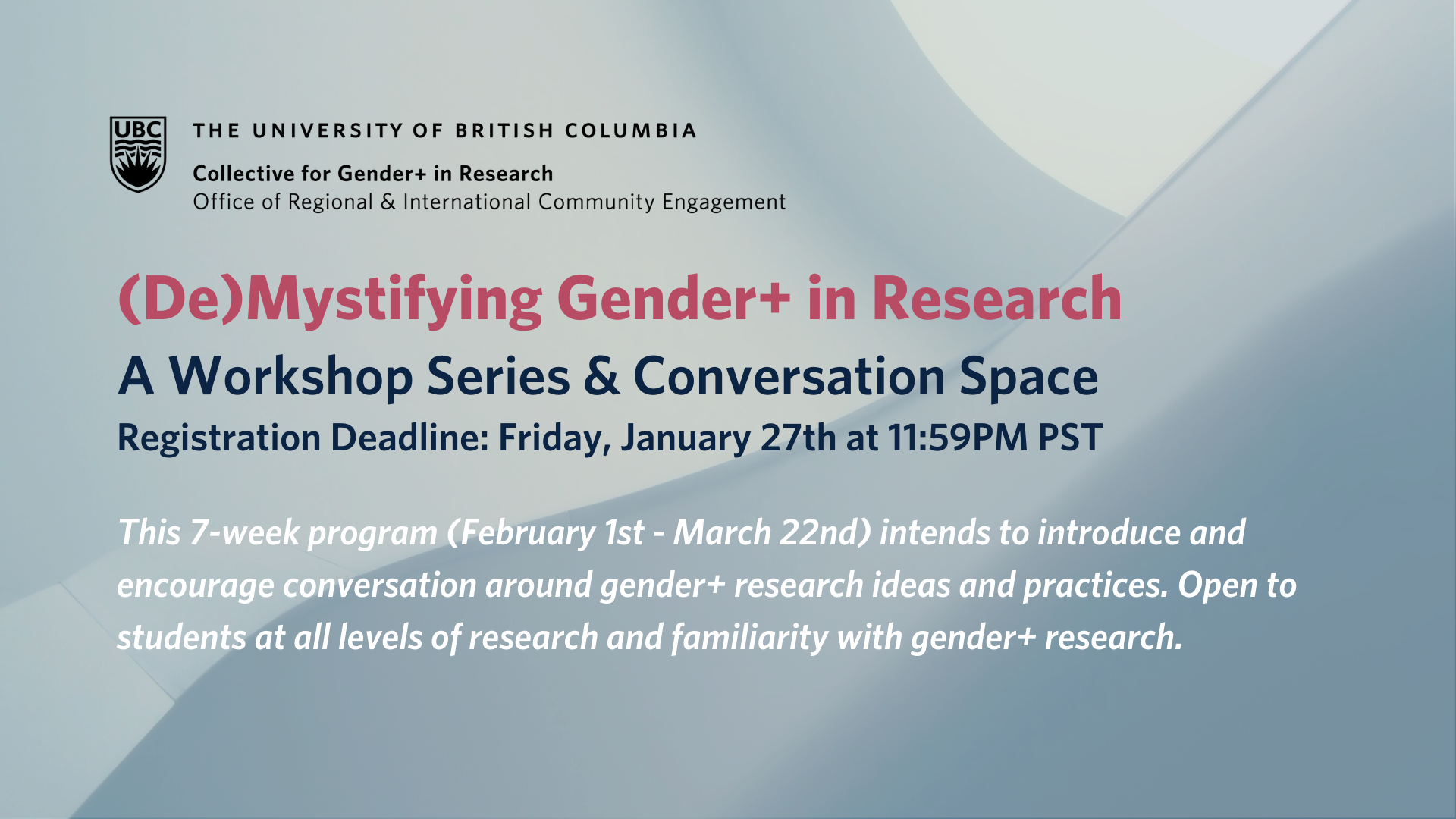
Overview
Calling all students interested in thinking critically and building community around doing gender intersectional research! Have you heard something about gender being important for research and want to find out more? Are you about to undertake a research project and want to think about including a gender+ lens? Are you in the midst of collecting data and reflecting on the role of power in the research process? We are open to students at all levels of research and familiarity with gender+ thinking – all we ask is that you are curious and willing to learn from your peers and guest speakers, and be engaged in thinking about gender+ informed research.
The Gender+ in Research Collective will be hosting a 7-week program about doing and reflecting on gender+ research. Students will be asked to commit to coming once a week to a 60+30(optional) minute session where we will progress through a mini-curriculum and community building exercise (lunch will be provided at each session).
We will begin by introducing the basic nuts and bolts of gender+ terminology and theory and then quickly progressing to critically reflecting on common “gender+ informed” research strategies. We will describe, unpack, and think constructively about the role of research practices like positionality statements, disaggregated data analyses, and citations. The group will also think alongside gender+ scholars and theorists about power, colonial knowledge-making practices, and the structural barriers to ‘good’ research, why we value some forms of data over others, and what we miss when we make choices around research methods and data collection tools. We will end off our series by inviting practitioners from across the campus to speak to us about how they go about bringing these critical perspectives to bear on their own work and where the shortcomings and the opportunities for gender+ might be found.
This series is intended both as a pedagogical tool to introduce students to the ideas and practices of gender+ research but also as an exercise in building community and connection. It is an interdisciplinary, inter-year, and intersectional venture and we welcome students at all stages of their journey with research and gender+ thinking to join us in learning together.
Participants will have the chance to learn, discuss and work in praxis with the theories and methodologies of gender+ through the three-part series:
- The foundations of gender+, intersectionality, positionality, processes of research and academia, and how they might hold space for gender-diverse discourse;
- The theories and methodologies that frame this work;
- Lastly, a praxis component centered on the art of compromis.
Program Timeline
Time: 12.00pm – 1.00/1.30pm (lunch will be provided)
Format: In-person (meeting room TBD)
Proposed Dates & Topics
- February 1: Program orientation / establishing ground / what is positionality / intersectionality anyway?
The Practical
- February 8th: Materializing gender / Gender+ research practices: positionality statements, citation practices, authorship
- February 15th: Disaggregated data: the hows and whats
- February 22nd: Reading Week (No Meeting)
The Theoretical
- March 1st: Power / theory / methodology and methodological choices in research / (de)valued knowledge in academia
- March 8th: Colonial Knowing
Praxis: The Art of Compromise
- March 15th: Guest Speaker (TBD): The limits to criticality; how to actually use gendered understandings to produce feminist research in complex contexts
- March 22nd: Guest Speaker (TBD): The complexity of embedding Indigenous ways of being / knowing into a colonial research institution; what changes in the institution? What is resistant to change? How can we do about this better?
Eligibility & Registration
This program is now currently full. Please email us at ubc.orice@ubc.ca if you are interested in being added to the waitlist for this program or register for the Gender+ mailing list to hear about more about future programs like this.